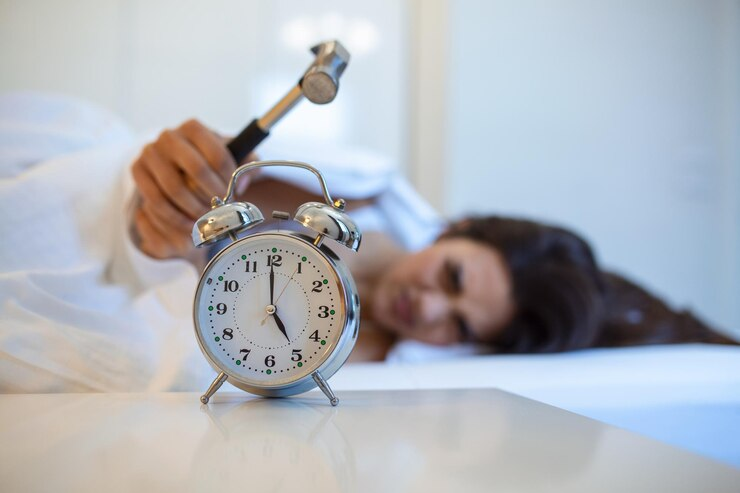Sleep is as essential to our well-being as a healthy diet and regular exercise. Yet, in our fast-paced world, prioritizing those precious hours of rest often falls by the wayside. This skimping on sleep can have a significant impact on our mental and physical health. Sleep hygiene refers to a set of practices that can help us achieve quality sleep. By incorporating these practices into our routines, we can improve the quality of our sleep and experience the numerous benefits for our mental well-being.
The Connection Between Sleep and Mental Health
Sleep is not a luxury; it’s a biological necessity. During sleep, our brains recharge, consolidate memories, and regulate emotions. Chronic sleep deprivation disrupts these vital processes, leading to a cascade of negative consequences for mental health. Studies have shown a strong link between sleep problems and conditions like anxiety, depression, and bipolar disorder.
Here’s a closer look at how sleep impacts mental health:
Emotional Regulation: Sleep deprivation disrupts the brain’s emotional centers, making it harder to manage stress and cope with difficult emotions.
Cognitive Function: Sleep is crucial for memory consolidation and learning. When sleep is impaired, our ability to focus, concentrate, and make decisions suffers.
Mood: Sleep deprivation can exacerbate symptoms of depression and anxiety, leading to feelings of hopelessness, irritability, and negativity.
The Power of Good Sleep Hygiene
Fortunately, sleep is a modifiable behavior. By implementing good sleep hygiene practices, you can train your body and mind for better sleep, ultimately improving your mental health. Here are five key strategies to get you started:
Establish a Consistent Sleep Schedule:
Our bodies thrive on routine. Go to bed and wake same time each day, even on weekends. This helps regulate your circadian rhythm, the internal clock that governs sleep-wake cycles. Sticking to a consistent schedule strengthens the body’s natural sleep-wake cues, making it easier to fall asleep and wake up refreshed.
Think of your circadian rhythm as your body’s natural light-darkness meter. When you consistently expose yourself to light and darkness at specific times, your circadian rhythm synchronizes with the external environment. This synchronization strengthens the body’s natural sleep-wake cues. Imagine your sleep cues as internal signals that tell your body it’s time to wind down or become alert. With a consistent schedule, these cues become stronger and more predictable. As a result, falling asleep becomes easier, and waking up in the morning feels more natural and refreshing.
Here are some additional tips for establishing a consistent sleep schedule:
Pick a sleep schedule that works for you: Ideally, aim for 7-9 hours of sleep per night. If you’re unsure about the ideal sleep duration for you, consult your doctor.
Gradually adjust your sleep schedule: If your current sleep schedule is significantly off, don’t try to change it overnight. Make small adjustments of 15-30 minutes every day until you reach your desired bedtime and wake-up time.
Set sleep and wake-up alarms: Use your phone or a bedside alarm clock to set reminders for bedtime and wake-up. The consistency of these alarms will further reinforce your sleep schedule.
Stick to the schedule even on weekends: It might be tempting to sleep in on weekends, but doing so can disrupt your circadian rhythm and make it harder to fall asleep on Sunday night. Try to maintain a consistent sleep schedule as much as possible, even on your days off.
Craft a Relaxing Bedtime Routine:
Our bodies thrive on routine, and creating a relaxing bedtime ritual signals to your brain and body that it’s time to wind down and prepare for sleep. Ideally, your bedtime routine should start 30-60 minutes before you hit the pillow and consist of calming activities that promote relaxation.
Here are some ideas to incorporate into your relaxing bedtime routine:
Dim the Lights:
Exposure to bright light, especially blue light emitted from electronic devices, suppresses the production of melatonin, a hormone that regulates sleep-wake cycles. Dim the lights in your bedroom an hour or so before bedtime. Consider using warm-toned lamps or candles to create a soothing ambiance.
Take a Warm Bath or Shower:
Immersing yourself in warm water can be incredibly relaxing. The warmth helps to loosen muscles and soothe tension while taking a bath or shower can be a calming ritual. Add some aromatherapy to the experience by using calming essential oils like lavender or chamomile in your bathwater.
Practice Gentle Stretches or Yoga:
Light stretching or yoga poses can help to release tension and prepare your body for sleep. Focus on gentle movements that promote relaxation rather than strenuous exercise that might be stimulating. Many yoga routines specifically designed for bedtime, often referred to as “yin yoga,” focus on passive stretches and mindful breathing.
Listen to Calming Music:
Soothing music can have a powerful effect on relaxation. Choose music with slow tempos, calming melodies, and minimal lyrics. Classical music, nature sounds, and ambient music are excellent choices for bedtime playlists.
Read a Book (Not on Electronics!):
Curling up with a good book is a classic way to unwind before bed. Reading allows you to de-stress and escape from the worries of the day. However, avoid reading on electronic devices like e-readers or tablets. The blue light emitted from these devices can disrupt your sleep cycle. Opt for a traditional book with printed pages for a more sleep-conducive experience.
Practice Relaxation Techniques:
Techniques like deep breathing exercises, progressive muscle relaxation, and meditation can all help quiet your mind and promote relaxation before bed. There are many guided meditation apps and resources available online to help you learn and practice these techniques.
Write in a Journal:
Taking 10-15 minutes to write in a journal before bed can be a great way to clear your mind of worries and anxieties. Use this time to reflect on your day, jot down any thoughts or concerns that might be keeping you up at night, or express gratitude for the positive aspects of your day.
Optimizing Your Sleep Environment for Restful Nights

Your bedroom should be a sanctuary dedicated to sleep. By creating a dark, quiet, cool, and clutter-free environment, you’ll send powerful signals to your body that it’s time to unwind and drift off to sleep. Here’s how to optimize your sleep environment for a truly restful night:
Darkness is Key:
Light exposure, especially blue light emitted from electronic devices and even bright sunlight peeking through windows, can suppress melatonin production. Melatonin is a hormone that regulates your sleep-wake cycle, so ensuring darkness in your bedroom is crucial. Invest in blackout curtains or a sleep mask that completely blocks out light. Consider layering curtains: use light-filtering curtains underneath heavier blackout curtains for maximum light blockage.
Silence the Night:
Even minor noises can disrupt sleep. Traffic sounds, a noisy roommate, or a barking dog can jolt you awake or prevent you from falling asleep soundly. Here are some strategies to create a quieter sleep environment:
Earplugs:
Earplugs are a simple and effective way to block unwanted sounds. Choose from different noise reduction ratings (NRR) depending on the level of noise you need to block.
White Noise Machine:
White noise machines generate a constant, ambient sound that can mask disruptive noises outside your bedroom. These machines can be particularly helpful if you live in a noisy environment or find yourself easily awakened by sudden sounds. There are even white noise machines with nature sounds or calming music options to create a more relaxing soundscape.
Communication is Key:
If you share your living space with others, talk to them about your need for a quiet sleep environment. Perhaps they can avoid loud activities during their designated sleep time or use headphones when watching television late at night.
Cool Comfort:
The ideal bedroom temperature for sleep is between 60-67 degrees Fahrenheit (15.5-19.4 degrees Celsius). A cool environment promotes deeper sleep and helps regulate your body temperature throughout the night. Consider using a thermostat that allows you to program a specific sleep temperature setting. If you tend to run hot or cold while you sleep, explore temperature-regulating bedding options like breathable sheets and comforters made from natural fibers.
Declutter for Serenity:
A cluttered bedroom can be visually stimulating and make it harder to relax. De-cluttering your sleep space involves more than just tidying the nightstand. Consider the overall visual impact of your bedroom. Put away any work materials or electronics that might be visually stimulating. Minimize clutter on surfaces and maintain a sense of order in your bedroom. This will create a calm and peaceful environment that promotes restful sleep.
Develop Healthy Sleep Habits for Better Sleep Quality
The choices you make throughout the day can significantly impact your sleep quality. Here are some healthy sleep habits to incorporate into your daily routine:
Mind Your Caffeine: Caffeine is a stimulant that can interfere with sleep, especially if consumed later in the day. Avoid caffeinated beverages like coffee, soda, and energy drinks in the afternoon and evening. If you’re sensitive to caffeine, consider limiting your intake altogether.
Eat Smart for Sleep: Avoid heavy meals and sugary foods close to bedtime. A heavy meal can take a long time to digest, leading to discomfort and disrupted sleep. Sugary foods can cause a blood sugar spike followed by a crash, which can also disrupt sleep patterns. Opt for a light, healthy dinner a few hours before bedtime.
Move Your Body, But Wisely: Regular exercise is a powerful sleep promoter. However, avoid strenuous workouts too close to bedtime, as they can be stimulating and make it harder to fall asleep. Aim for moderate-intensity exercise earlier to reap the sleep benefits without interfering with your nighttime routine.
Manage Stress Before Bed: Chronic stress can wreak havoc on your sleep. If you find your mind racing at night, try relaxation techniques like deep breathing exercises, progressive muscle relaxation, or meditation before bed. These techniques can help quiet your mind and prepare your body for sleep. Consider journaling to clear your mind of worries before sleep. Write down any thoughts or concerns that might be keeping you up at night, allowing you to release them and focus on relaxation.
Additional Tips for Better Sleep
Get regular sunlight exposure: Sunlight helps regulate your circadian rhythm. Aim for at least 30 minutes of natural light exposure in the morning.
Avoid napping during the day, especially long naps: Long naps can disrupt your nighttime sleep. If you must nap, keep it short (20-30 minutes) and avoid napping late in the afternoon.
See a doctor if you have persistent sleep problems: If you’ve tried these strategies and still struggle with sleep, consult a doctor to rule out any underlying medical conditions that might be affecting your sleep.
Conclusion
Prioritizing sleep is an investment in your overall well-being. By establishing good sleep hygiene practices, you can improve the quality of your sleep and experience a positive impact on your mental health. Remember, consistency is key. Stick with these practices, and you’ll be well on your way to a better night’s sleep and a healthier, happier you.


